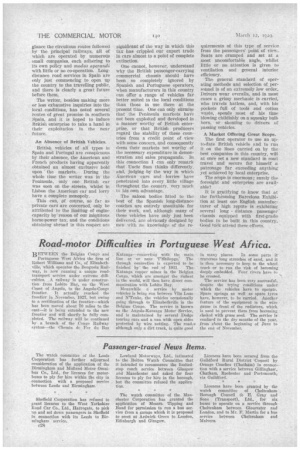Road-motor Difficulties in Portuguese West Africa.
Page 58

If you've noticed an error in this article please click here to report it so we can fix it.
BETWEEN the Belgian Congo and Portuguese West Africa the firm of Robert Williams and Co., of Elizabeth:vine, which operates the I3enguela Railway, is now running a unique roadtransport service under extreme difficulties. A railway is under construction from Lobito Bay, on the West Coast of Angola, to the Angola-Congo frontier. It actually reached the frontier in November, 1027, but owing .t a rectification of the frontier—which has been moved about 70 miles to the cast—it is being extended to the new frontier and will shortly be fully completed. The railway will be continued by a branch of the Congo Railway system—the Chemin de. Per du Ens
Katanga—connecting with main the
line at or near • T'Shilong,o.The through eonnection is expected to -be finished by' the end of 1931. The Katanga copper mines in the Belgian Congo, which are -amongst the richest in the world, will then have direct communication with Lobito Bay.
Meanwhile a service by motor vehicles is being run between Vila Limo and N'Tenke, the vehicles occasionally going through to Elizabethville in the Belgian Congo. The service is known as the Angola-Katanga Motor Service, and is maintained by several Dodge touring cars and a van with open sides protected by wire netting. The road,. although only a dirt -track, is quite good
in many places. In some parts it trawirses long stretches of sand, and it is then necessary to keep to the wheel track or to run the risk of becoming deeply embedded. Four rivers have to
be crossed. • The service has been very successful, despite the tryingconditions under which the vehicles have to operate. Spare springs as well as spare tyres have, however, to be carried. Another feature of the equipment is the wire gauze in front of the radiators, which is used to prevent them from becoming choked with grass seed. The service is confined to the dry months of the year, from about the beginning of June to the end of November.




























































































































